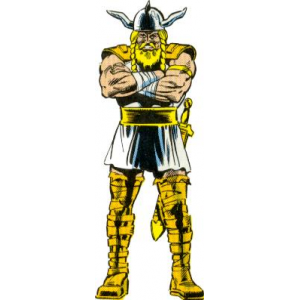 The Gods resumed their wonted occupations, and were soon casting their golden disks on the green plain of Ida, which was called Idavold, the playground of the Gods. At last, wearying of this pastime, and knowing that no harm could come to their beloved Balder, they invented a new game and began to use him as a target, throwing all manner of weapons and missiles at him, certain that no matter how cleverly they tried, and how accurately they aimed, the objects, having sworn not to injure him, would either glance aside or fall short. This new amusement was so fascinating that soon all the Gods were assembled around Balder, at whom they threw every available thing, greeting each new failure with prolonged shouts of laughter. These bursts of merriment soon excited the curiosity of Frigga, who sat spinning in Fensalir; and seeing an old woman pass by her dwelling, she bade her pause and tell what the Gods were doing to provoke such great hilarity. The old woman, who was Loki in disguise, immediately stopped at this appeal, and told Frigga that all the gods were throwing stones and blunt and sharp instruments at Balder, who stood smiling and unharmed in their midst, daring them to touch him.
The Gods resumed their wonted occupations, and were soon casting their golden disks on the green plain of Ida, which was called Idavold, the playground of the Gods. At last, wearying of this pastime, and knowing that no harm could come to their beloved Balder, they invented a new game and began to use him as a target, throwing all manner of weapons and missiles at him, certain that no matter how cleverly they tried, and how accurately they aimed, the objects, having sworn not to injure him, would either glance aside or fall short. This new amusement was so fascinating that soon all the Gods were assembled around Balder, at whom they threw every available thing, greeting each new failure with prolonged shouts of laughter. These bursts of merriment soon excited the curiosity of Frigga, who sat spinning in Fensalir; and seeing an old woman pass by her dwelling, she bade her pause and tell what the Gods were doing to provoke such great hilarity. The old woman, who was Loki in disguise, immediately stopped at this appeal, and told Frigga that all the gods were throwing stones and blunt and sharp instruments at Balder, who stood smiling and unharmed in their midst, daring them to touch him.
The Goddess smiled, and resumed her work, saying that it was quite natural that nothing should harm Balder, as all things loved the light, of which he was the emblem, and had solemnly sworn not to injure him. Loki, the personification of fire, was greatly disappointed upon hearing this, for he was jealous of Balder, the sun, who so entirely eclipsed him and was generally beloved, while he was feared and avoided as much as possible; but he cleverly concealed his chagrin, and inquired of Frigga whether she were quite sure that all objects had joined the league.
Frigga proudly answered that she had received the solemn oath of all things, except of a harmless little parasite, the mistletoe, which grew on the oak near Valhalla’s gate, and was too small and weak to be feared. Having obtained the desired information, Loki toddled off; but as soon as he was safely out of sight, he resumed his wonted form, hastened to Valhalla, found the oak and mistletoe indicated by Frigga, and by magic arts compelled the parasite to assume a growth and hardness hitherto unknown.
Free eBooks (Can Be Downloaded):
Daniel Haigh - The Anglo Saxon SagasVovim Baghie - The Grand Satanic Ritual
Aleister Crowley - The Book Of The Law
Morwyn - The Golden Dawn
